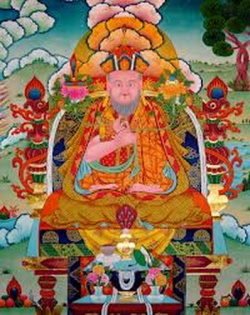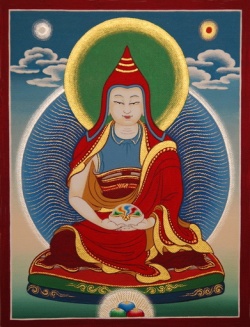Vidyadhara
Vidyadharas)(Sanskrit: विद्याधर, Vidyādhara, literally "wisdom-holders") are a group of supernatural beings in Hindu mythology. They possess magical powers and dwell in the Himalayas. They also attend God Shiva, who lives in the Himalayas. They are considered as Upa-devas, semi-gods.
Vidyadhara (Skt. vidyādhara; Tib. རིག་འཛིན་, rigdzin; Wyl. rig 'dzin) — literally ‘awareness holder’. According to Dilgo Khyentse Rinpoche, it indicates someone who constantly abides in the state of pure awareness of 'rigpa’.
Vidyadhara; Demi-gods. These beings, whose realm is between heaven and earth, can assume any shape they choose and sometimes marry mortals. In some lore, occasionally referred to as Vidyadhara, Taditkara, Taditkara or Vidyadhara
vidyadhari; A nymph. These beings live in the forests and rivers. Also known as vidyadhari, bidadari, bidadari, bijadhari, bijadhari, Javanese widyadhari Pacific bidadari or Javanese widyadhari Pacific bidadar
‘Knowledge-holders’. 1. A class of powerful beings thought to live in the snowy mountains of north India and have various supernatural powers derived from their mastery of magical powers (vidyā) such as longevity, the ability to fly or to change shape. According to some sources, they were thought to have been guardians of tantric lore, hence the early tantric corpus of texts was called the Vidyādhara Piṭaka in contrast to the Sūtra and Vinaya Piṭakas.
2. By extension, vidyādhara is used as a title for people who have completed the tantric training and who are believed to be endowed with various magical powers.
In Hindu epics
In the Hindu epics, Vidyadharas are described as essentially spirits of the air. They are described as doing different activities in the epics like gazing at human prowess with astonishment, strewing flowers watching a combat, rejoicing with music and laughter, crowned with wreaths and fleeing with their wives from danger. They possess great magical powers like the ability to diminish their size. They are endowed with epithets describing them as "doers of good and devoted to joy". They also live in Gandhamandhana mountain and other Himalayan mountains with Kinnaras. They are also described residing on Mount Krauncha, on Citrakuta where Rama saw Vidyadhara women playing, in the hills of Malabar and in the Khandava forest. They are also seen in Kubera's court, headed by their leader Chakradharman and in Indra's palace under Vipracitti. Jain legends describe Vidyadharas as evil beings and Vipracitti is described as a demon. A third leader of the Vidyadharas is described to the wise Jambavan. In the epic Mahabharata, Vidyadharas are described as following Indra with other semi-divine beings to the serpent-sacrifice of Janamejaya. In the epics, the women of the Vidyadharas, called Vidyadharis are described to possess great beauty, and were victims of kidnapping by demons like Ravana. Vidyadhara is also another name for Lord Ganesha.
In Puranas and other texts
In Agni Purana, they are described as wearing garlands in the sky and mentioned with other semi-divine beings like Yakshas and Gandharvas.
In the Bhagavata Purana, Citraketu is described as the king of Vidyadharas. It also tells about a cursed Vidyadhara called Sudarshana. In various references in the Purana, they are coupled with other semi-divine beings, who pray to god Vishnu for help or enumerated among the many creations of God. The Vidyadharas with siddhas are said to have milked Mother Earth (Prithvi), who had assumed the form of cow by using sage Kapila as the calf and collected different yogic mystic powers (siddhis) and the art of flying as milk in the pot of the sky.
Gunadhya has composed stories of seven Vidyadharas, destroying six of them as the king did not like them and retained the story of Naravahanadatta, which became the Brhatkatha written in Paishachi language and later translated into Sanskrit as Brhatkathamanjari. Kathasaritsagara presents some stories about Vidyadharas like Devadatta (a Brahmin boy who acquired Vidyadhara-hood), Jimutavahana, Muktaphalaketu and Naravahanadatta (who became an emperor of the Vidyadharas)

